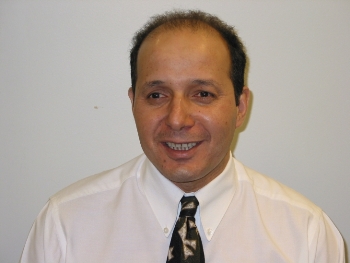Feb 21 2013
Our digitized world of instant communication is enabled by the transfer of high-speed signals across many systems within a device. As modern signal speeds are pushed to quickly accommodate gigabytes of data, disturbances that were once considered minor, such as weather changes, now become more serious, with the potential to stop systems and corrupt data.
 Sedig Agili, associate professor of electrical engineering at Penn State Harrisburg.
Sedig Agili, associate professor of electrical engineering at Penn State Harrisburg.
Sedig Agili, associate professor of electrical engineering at Penn State Harrisburg, and Aldo Morales, professor of electrical engineering, have developed a formula to help understand the effects of humidity and temperature on electronic signals.
The researchers studied environmental effects on miscrostrips, or interconnecting pieces that convey radio wave signals between electronic systems. By testing the microstrips at high humidity and temperature levels, the pair developed a model to predict how the devices would perform under different environmental conditions.
These findings will have meaningful impact for engineers and manufacturers in the communications industry, Agili said. “The model will help digital designers to see how a circuit board would perform in a harsher environment,” he said.
Agili and Morales co-direct the campus' Center for Signal Integrity, an academic unit that partners with the area’s connector companies in product development through faculty and student research and collaboration. The center also provides employee training and serves as a clearinghouse for the latest research in the field. With more than 25 electrical connector companies, Harrisburg is known as the connector capital of the world.